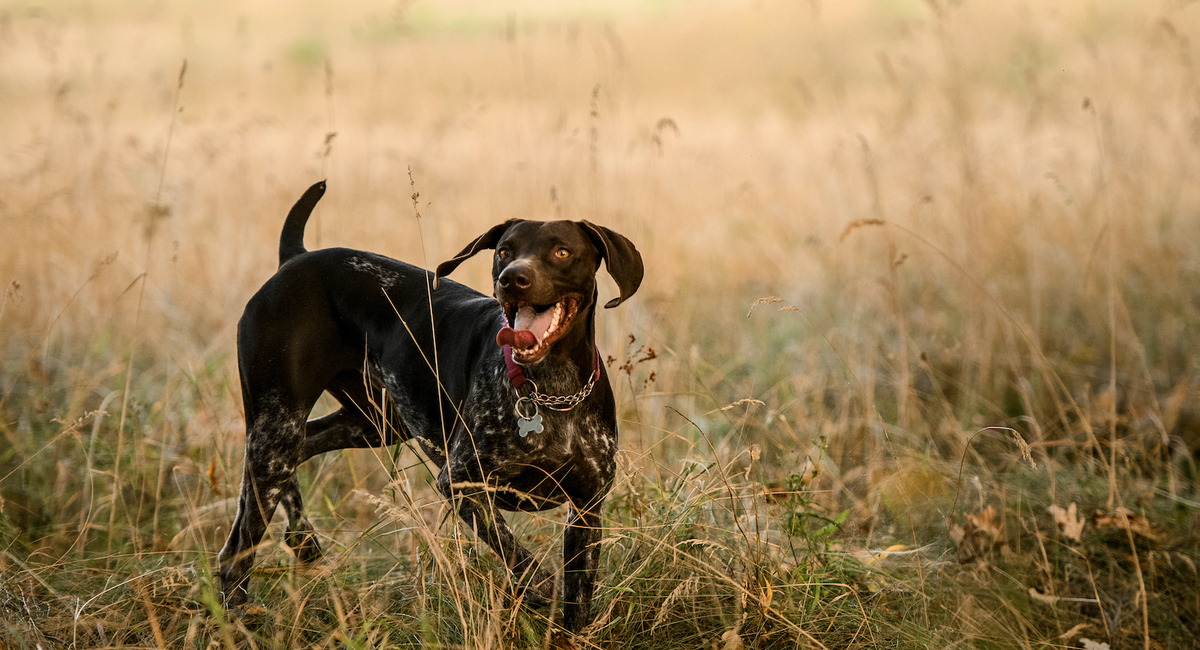Of all the tools in your hunting arsenal, your most valuable one (not to mention the most loyal and loving one) is your hunting dog. And whether you take him out to retrieve ducks or flush doves, your dog needs a little extra care to keep him happy and healthy on the hunt.
Here are Pine Street Animal Hospital’s suggestions for taking good care of your hunting dogs, ensuring they stay healthy, happy and ready to be at your side for many seasons to come.
1. Get vaccinated. All dogs need routine vaccinations, but the vaccines they require differ based on lifestyle. Talk to your vet about your hunting dog’s activities: Is he regularly around other dogs? Does he wade in still water often? Do you board him? These answers can help the vet decide which vaccines your hunting dog needs to help protect him from the threats of serious illness that can be contracted by wild animals, natural water and other situations. Read more about PSAH’s approach to vaccine protocol here.
2. Feed them well. Good food fuels a healthy, active dog. And since active hunting dogs and sporting dogs expend a lot more energy than indoor-only dogs, their need for food is different. Most hunting dogs require more calories than other dogs of similar weights. Hunting dogs may also benefit from eating more protein. That said, just because your dog is a hunting breed, like a spaniel or hound, it doesn’t mean she needs these extra calories. The increase in food/protein is in line with an increase in activity, so adjust food based on how active your dog is. The best way to determine what to feed your hunting dog and how much (and how to vary by season/activity) is to talk with your vet. At Pine Street, Dr. Adcock is an active outdoorsman who understands the unique needs of sporting dogs, and he’d be happy to work out a food plan for your hunting dog.
3. Care for paws. Hunts can take dogs through a variety of environments that can be hard on their feet, so always check your dogs’ paws after a hunt. Look for pebbles or burrs wedged between the pads and remove them with tweezers. If you notice small cuts or abrasions, clean them with soap and water or an antibacterial wash. For larger cuts, visit your vet. If you notice the pads are dry or cracked, apply a moisturizer made for dog pads (not human lotion). And finally, if your dog has been in salt water, rinse paws with fresh water to prevent the salt from caking onto his paws.
4. Prevent fleas, ticks and parasites. Hunting dogs spend a lot of time outdoors and thus can be exposed to more parasites. Every hunting dog should be on a regular flea-and-tick prevention medicine. These prescription tablets (or skin applications) work internally and reliably to prevent your dog from being bitten by fleas and ticks. This helps prevent the various diseases that ticks carry, and prevents your dog from bringing these pests into your home. For best protection, give your dog the preventative medication every month throughout the year, not just during hunting season.
5. Take steps after a wet hunt. Your dog’s skin and coat provides a natural barrier against most of the things that live in a lake or stream. But infections can still get through a cut or abrasion, or water can get trapped under his coat (causing potential bacterial issues, not to mention a bad smell). You don’t have to wash him with shampoo after every swim, but you should rinse your dog in fresh water, paying special attention to rinsing off paws and ears. Towel-dry long-haired dogs to prevent moisture issues, and towel-dry all dogs’ ears to prevent fungal or bacterial infections.
6. Allow for rest and recuperation. Remember that your dog is working hard during a hunt. Allow time for her to recover after a day of hunting. Don’t press a clearly exhausted dog to work too long. She wants to please you, but she also needs to rest. If your dog seems particularly sore after a long day, you can give her a mild pain reliever or anti-inflammatory as prescribed by your vet (do not give human over-the-counter medicines).
Your sporting dog is not only your best hunting tool, she’s also your companion. Taking a few steps to ensure her health and happiness can help you both be able to enjoy hunting seasons all year and for years to come.
If you have any questions about caring for your hunting dog or sporting dog, schedule an appointment with Pine Street Animal Hospital in Spartanburg today.



